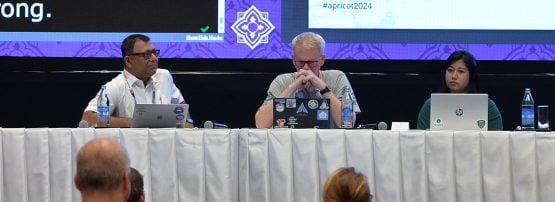
The APNIC Open Policy Meeting (OPM Policy SIG) will be held on Wednesday, 26 February 2025 from 9:30 to 11:00 (UTC +8:00) during APNIC 59.
Everyone interested in shaping policies and procedures for resource allocation, recovery, transfer, and registration is invited to attend the Policy SIG in person or remotely. This includes whois, reverse DNS, RPKI, and related services provided by APNIC, National Internet Registries (NIRs), and ISPs.
The APNIC 59 OPM has two whois-related policy proposals for community discussion at APRICOT 2025.
prop-162: WHOIS Privacy
This proposal recommends removing the unnecessary public listing of APNIC Member organization contact details from the APNIC Whois Database bulk access mechanisms. Those with a legitimate need for this information can access it through an APNIC-provided service.
The APNIC Secretariat notes that this proposal aims to remove Member organization details such as email addresses, telephone numbers, and physical addresses from bulk whois data. Additionally, existing republishers of APNIC whois data would be required to delete contact information as a condition of continued access.
APNIC would like to clarify that the organizations referenced in the proposal do not have access to APNIC bulk whois data. Additionally, while APNIC doesn’t currently apply any rate limits to queries on the APNIC Whois Database, we can do so if necessary. Other Regional Internet Registries (RIRs) have implemented similar measures, including limiting the number of personal data sets returned in queries.
For implementation, the Secretariat notes that this proposal may require changes to APNIC systems, internal policy, procedures, and agreements and if it reaches a consensus, implementation may be completed within three months.
prop-163: Enhancing WHOIS Transparency and Efficiency Through Referral Server Implementation.
This proposal recommends adding Whois Referral (RWhois, RFC 2167) server support to automatically redirect whois resource queries in appropriate cases. There are three scenarios where these redirects would be useful: Inter-RIR transfers, delegations to NIRs who have their own whois servers, and delegations to account holders who would like to run their own whois servers.
The Secretariat notes there are various questions and comments about this proposal, regarding:
- Inter-RIR transfers: RDAP already provides redirection for resources transferred between RIRs.
- NIR delegations: NIRs with standalone whois databases already share that data with APNIC, for publication via whois.apnic.net.
- Downstream allocations: Account holders can currently publish delegation data via MyAPNIC or the registry API, and there is no clear use case for running an independent whois server for that purpose.
- Technical considerations: RDAP is preferred over RWhois due to its simplicity, security, and widespread adoption. Any changes must balance transparency with privacy concerns.
The Secretariat also notes that APNIC system changes may be required, and implementation is expected to take up to 12 months if the proposal reaches consensus.
Participate! Have your say
Good policy relies on a range of opinions from people in different parts of the community, so it is important to get involved. They are developed through an open, transparent, and bottom-up process of consultation and consensus.
Here are the steps to participate and voice your opinions on proposals:
- Join the Policy SIG mailing list to discuss proposals before the Open Policy Meeting (OPM).
- Attend the OPM, listen to how the proposed policies potentially affect your networks and/or business and ask questions.
- Join the consensus call to show your support or object to the proposed solution.
Why you should get involved in the OPM
This is a community-driven process where you can affect real change. Input from all parts of the region and all community members is encouraged, and it’s a great way to learn more about important aspects of network operations. As any policy change will affect you, it is important to let others know what you think of proposed changes.
For more details about participating, please visit the APNIC 59 policy page.
The views expressed by the authors of this blog are their own and do not necessarily reflect the views of APNIC. Please note a Code of Conduct applies to this blog.
